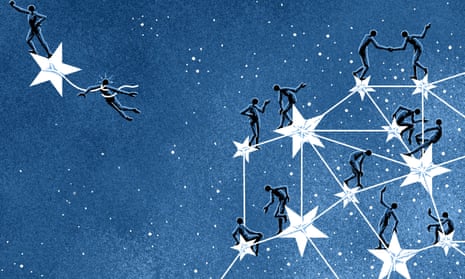On a few occasions recently I’ve overheard myself talking despairingly about “the English”. I feel ashamed of it. I don’t think of my wife or my children as “the English” or my friends, neighbours and colleagues as “the English” – though many, probably most of them, were born in England and could be so described.
As a guide to human characteristics, “the English” isn’t useful. Like many general descriptions, it falters in the face of the particular. “The masses are always the other, that we do not know, and cannot know,” wrote the scholar and critic Raymond Williams in 1958, and perhaps I’m starting to use “the English” in a similar way, to describe people other to myself and the people I know at first or second hand.
Not good. No doubt my upbringing had many flaws, but on the plus side (so I like to think) it taught me to distrust what had yet to be called national stereotypes. That there was “good and bad everywhere” might have been stitched in samplers and hung in every room (instead of which, in one room only, we had the lines from Burns, about seeing ourselves as others see us).
The tragedy of the first world war bred a distrust of nationalism among many of my parents’ generation, and increased the appeal of the internationalism offered by socialist groups such as the Independent Labour party. Enhancing that broad philosophy, in my parents’ particular case, was the experience of migrating from lowland Scotland to northern England, where they preferred to be seen as themselves – individuals who happened to be from Scotland – rather than as émigrés announcing a group identity with spectacular enthusiasms such as kilt-wearing and Highland dancing.
Sometimes these attitudes had a practical effect. At the end of the second world war my father and elder brother befriended a prisoner of war, a soldier in the Wehrmacht, who lived in a camp nearby. The friendship began when my brother, then a schoolboy, exchanged a German-English pocket dictionary for some souvenir scraps of German uniform – epaulettes and badges – and continued by letter after the sergeant was released and went home to Hamburg.
His name was Karl Bohnsack, and he and his family regularly corresponded with us into the 1980s, with parcels at Christmas that smelt of eau de cologne and marzipan. I never met them, but they were as strong a presence in our family as our relatives. In our house “the Bohnsacks” was a phrase that was heard more, and meant more, than “the Germans”.
As to our own national identity, I suppose we thought of ourselves as British/Scottish, but the question hardly came up. By the time I was old enough to take an interest in such things we were living back in Scotland, not far from a Royal Navy dockyard. Sailors with English accents filled the dancehalls, the cinemas, the buses and the pubs. Still, nobody thought of them as “the English”: their accents didn’t make them different people to us, culturally and politically. It may even be that we saw them as a norm, the standard British issue, the straightforward types in British films where actors from Scotland, Ireland and Wales took the character parts.
We might complain about Cockney gabbiness or joke about English parsimony – a random memory is mockery of a family from somewhere like Chatham who thought of thinly spread meat-paste sandwiches as a special teatime luxury – but that was probably revenge for the English canard that the Scots are mean.
Of course, to be British had once been a braggart identity. Some of that boastfulness, rekindled by the coronation, dimmed by Suez and kept alive by war films, survived into the 1960s. But then, in the century’s last decades, “British” as a self-description began to offer something else. With fewer connotations of blood and soil than the growing nationalisms of the United Kingdom’s constituent parts, it had room for newcomers from abroad and for people like me who found its capaciousness and slackness attractive. Here was a civic nationalism that meandered attractively like an old river, its dangerous force spent far upstream.
Constitutional devolution and the strength, in particular, of the Scottish independence movement provided serious threats, but in the Scottish referendum campaign of 2014 many people, including me, argued for the preservation of Britain as a state and British as an identity; and of the people who voted, 55% agreed.
I’m now much less sure. What Britishness went on concealing until very recently – like a host body with a very large grub inside, struggling to emerge – was Englishness. The England/Britain confusion has existed for centuries: all kinds of people, ranging from London dockers through foreign diplomats to writers such as George Orwell, imagined that the terms were coterminous and interchangeable. (Glasgow was “the centre of the intelligence of England” according to the Grand Duke Alexis, who attended the launch of his father Tsar Alexander II’s steam yacht there in 1880.)
The separatist movements of Scotland and Wales began to dent this idea in England, but the English response was slow. A competing English nationalism was at first confined to fringe meetings about the West Lothian question and a campaign for an English parliament. Then came the rise of Nigel Farage’s Ukip, the Tory strategy for dealing with it and that strategy’s failure in the EU referendum. We have come to where we are – which is to say that English nationalism has found its opportunity, and is taking us out of Europe.
The prospects it offers are fantastical, outdoing anything the Scottish National party promised even in its most romantic period. English exceptionalism has flared up: we are a great country, there is nowhere else like us, we shall lead the world in free trade, we shall sell ginger snaps to the North Koreans. On Thursday night on the BBC I heard Conrad Black, the disgraced Canadian newspaper publisher, evoke “this sceptred isle” in a little speech that drew applause from his audience in Hartlepool.
The notion of Brexit as a popular victory is confined almost entirely to the English, albeit that its prominent cheerleaders include Liam Fox and (in the past) Michael Gove. Its ramifications are troubling for Scotland and particularly severe for Northern Ireland.
The novelist Eimear McBride wrote a fine sentence on the Irish repercussions in the Guardian this week: “That this delicate, hard-won and harder-maintained web of hope has been so carelessly, thoughtlessly jeopardised by a handful of bloviating careerists unashamed to fan fear and division in British society in order to achieve their personal ambitions is a disgrace they will forever bear.”
I’m not sure I feel the same level of anger and alienation. Neither, of course, do I share the average east European migrant’s uncertainty over his or her future. But my sense of belonging is a little less, and I have a slight (and perhaps slightly embittering) feeling of betrayal – similar in kind though not in scale to those loyal communities in the old empire such as the Anglo-Indians, who came to believe in the end that they had hitched their fortunes to the wrong star. “A family with the wrong members in control – that, perhaps, is as near as one can come to describing England in a phrase,” wrote Orwell in 1941, and this autumn it has never seemed truer.

